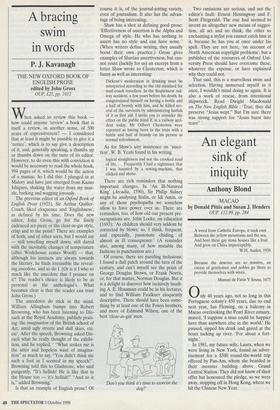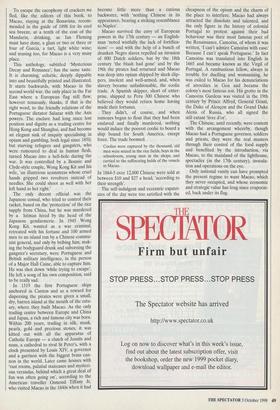An elegant sink of iniquity
Anthony Blond
MACAO by Donald Pittis and Susan J. Henders OUP, £12.99, pp. 284 A weed from Catholic Europe, it took root Between the yellow mountains and the sea, And bore these gay stone houses like a fruit And grew on China imperceptibly.
W.H. Auden, 1938 Because the dowries are so massive, an excess of gentlemen and nobles go there to provide themselves with wives.
Manuel de Faria Y Sousa, 1675 Only 40 years ago, not so long in this Portuguese colony's 450 years, due to end next year, Ian Fleming, on a balcony in Macao overlooking the Pearl River estuary, mused, 'I suppose a man could be happier here than anywhere else in the world.' He paused, sipped his drink and gazed at the boats tacking up river. 'For about a fort- night.'
In 1981, my future wife, Laura, when we were living in New York, found an adver- tisement for a $500 round-the-world trip offered by Pan-Am, whom she bearded in their monster building above Grand Central Station. They did not know of their offer but honoured the pledge, so we were away, stopping off in Hong Kong, where we hit the Chinese New Year. To escape the cacophony of crackers we fled, like the editors of this book, to Macao, staying at the Bonavista, recom- mended in the guide of 1898 for its cool sea breeze, at a tenth of the cost of the Mandarin, drinking, as Ian Fleming must have done, a glass or two or three or four of Garcia, a tart, light white wine; and musing too, for Macao is a very musy place.
This anthology, subtitled 'Mysterious Decay and Romance', has the same taste. It is charming, eclectic, deeply dippable into and beautifully printed and illustrated. It starts backwards, with Macao in the second world war, the only place in the Far East where a European flag still flew, however tenuously, thanks, if that is the right word, to the friendly relations of the Portuguese dictator Salazar with the Axis powers. The enclave had long since lost position and dignity as a trading centre for Hong Kong and Shanghai, and had become an elegant sink of iniquity specialising in opium and gambling, both legal since 1850; but starving refugees and gangsters, who were rumoured to deal in human flesh, turned Macao into a hell-hole during the war. It was controlled by a Bonnie and Clyde-style couple, Wong Kong Kit and his wife, 'an illustrious seamstress whose cruel hands gripped two revolvers instead of needles. She could shoot as well with her left hand as her right.'
The only decent official was the Japanese consul, who tried to control their racket, based on the 'protection' of the rice supply from China, but he was murdered by a hitman hired by the head of the Japanese gendarmerie. In 1945 Wong Kong Kit, wanted as a war criminal, retreated with his fortune and 100 armed men to an island run by a Chinese commu- nist general, and only by bribing him, mak- ing the bodyguard drunk and suborning the gangster's secretary, were Portuguese and British military intelligence, in the person of a Major Hall Caine, able to capture him. He was shot down 'while trying to escape'. He left a song of his own composition, said to be really sad. In 1519 the first Portuguese ships anchored in Canton and as a reward for dispersing the pirates were given a small. dry, barren island at the mouth of the estu- ary, where they built Macao. As the only trading centre between Europe and China and Japan, a rich and famous city was born. Within 200 years, trading in silk, musk, pearls, gold and precious stones, it was kitted out with all the apparatus of Catholic Europe — a clutch of Jesuits and nuns, a cathedral to rival St Peter's, with a clock presented by Louis XIV, a governor and a garrison with the biggest brass can- non in the world. Later came houses with `vast rooms, palatial staircases and mysteri- ous verandas, behind which a great deal of fun was often going on', according to the American traveller Osmond Tiffany Jr, who visited Macao in the 1840s when it had become little more than a curious backwater, with 'nothing Chinese in its appearance, bearing a striking resemblance to Naples'.
Macao survived the envy of European powers in the 17th century — an English- man 'noted wistfully the lack of fortifica- tions' — and with the help of a bunch of drunken Negro slaves repelled an invasion of 800 Dutch soldiers, but by the 18th century 'the blush had gone' and by the 19th the pirates had returned and Macao was deep into opium shipped by sleek clip- pers, insolent and well-armed, and, when slavery became unfashionable, the coolie trade. A Spanish skipper, short of enter- prise, shipped to Peru 300 Chinese who believed they would return home having made their fortunes.
They didn't, of course, and when rumours began to float that they had been enslaved and finally murdered, nothing would induce the poorest coolie to board a ship bound for South America, except force. The trade boomed.
Coolies were captured by the thousand, old men were seized in the rice fields, boys in the schoolroom, young men in the shops, and carried to the suffocating holds of the vessels in Macao.
In 1864-5 over 12,000 Chinese were sold at between $10 and $27 a head, 'according to their strength'.
The self-indulgent and eccentric expatri- ates of the day were too satisfied with the cheapness of the opium and the charm of the place to interfere. Macao had always attracted the dissolute and talented, and the only figure in the history of colonial Portugal to protest against their bad behaviour was their most famous poet of the Renaissance, Camoens, of whom it was written, 'I can't admire Camoens with ease/ Because I can't speak Portuguese.' In fact Camoens was translated into English in 1665 and became known as the Virgil of Portugal. A rumbustious fellow, always in trouble for duelling and womanising, he was exiled to Macao for his denunciations of atrocities in Goa and became the colony's most famous son. His grotto in the Camoens Gardens was visited in the 19th century by Prince Alfred, General Grant, the Duke of Alencon and the Grand Duke Alexis of Russia, who all signed the still extant lyre d'or'.
The Chinese, until recently, were content with the arrangement whereby, though Macao had a Portuguese governor, soldiers and priests, they were the real masters through their control of the food supply and benefited by the introduction, via Macao, to the mainland of the lighthouse, spectacles (in the 17th century), inocula- tion and operations on the eye.
Only national vanity can have prompted the present regime to want Macao, which they never occupied, and whose economic and strategic value has long since evaporat- ed, back under its flag.











































































 Previous page
Previous page